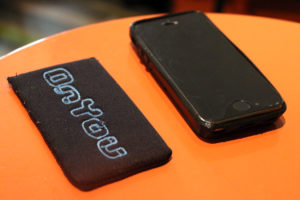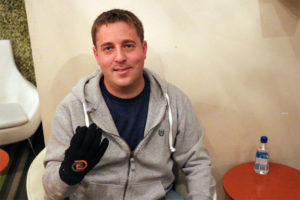Editor’s Note: Sponsored by Monday Properties and written by ARLnow.com, Startup Monday is a weekly column that profiles Arlington-based startups and their founders. The Ground Floor, Monday’s office space for young companies in Rosslyn, is now open. The Metro-accessible space features a 5,000-square-foot common area that includes a kitchen, lounge area, collaborative meeting spaces, and a stage for formal presentations.
Success in business isn’t always easily defined as it varies from company to company, industry to industry, market to market. This is especially true for startups, as success often relies on using trends and feedback to grow and explore new opportunities, even if they’re different than the ones that inspired the company in the first place.
ARLnow has profiled several startups who have done this. After first being profiled a year ago, some of them experienced positive growth in 2015 and have plans to continue to grow in 2016.
 One of these is OnYou, a company that created a magnetic armband phone case specifically designed for runners, bicyclists and other fitness buffs. While the magnets in the armband are strong enough to keep smartphones safe and in place during such activities, the phone can easily be detached from the armband and used, for example, to change the music or answer a text message.
One of these is OnYou, a company that created a magnetic armband phone case specifically designed for runners, bicyclists and other fitness buffs. While the magnets in the armband are strong enough to keep smartphones safe and in place during such activities, the phone can easily be detached from the armband and used, for example, to change the music or answer a text message.
This summer, OnYou co-counder Scott Bauer — who started the company while he was still in grad school at George Mason University — reported that after running a successful Kickstarter campaign. the company won a business competition in April 2015. By July, OnYou was selling products from its own website and shipping products directly to customers.
According to their Facebook page, OnYou has upgraded its armband design and will be unveiling new products after the new year.
In another sector of the wearable cellular technology world, GoGlove has also moved from the pre-sales of a successful Kickstarter and is selling the product from its own website and on Amazon. The Bluetooth gloves allow wearers to answer their cell phones, change music or control apps without taking a phone out of their pocket.
 “Feedback from initial sales have been great,” GoGlove co-founder Michael Conti said. “A lot of buyers have e-mailed us saying that it was a huge hit as a Christmas gift.”
“Feedback from initial sales have been great,” GoGlove co-founder Michael Conti said. “A lot of buyers have e-mailed us saying that it was a huge hit as a Christmas gift.”
Since the company was first featured about a year ago, they’ve developed other Bluetooth products. Bluz — a Bluetooth development kit that operates via the cloud — now has its own Kickstarter and is available for pre-sale. Conti added they’ve also been contacted by other companies interested in integrating the wireless technology into their own products.
Another startup that’s realized new opportunities in their segment this year is Cards Against Urbanity, a parody card game that has now proved as the most effective means of connecting planning firms and the people with the most concerns — the residents.
 Created by GreaterPlaces co-founder Lisa Nisenson and her colleagues, the game was started as a means of getting these residents involved in their city’s urban planning processes. The cards, it turned out, left more of an impact with players than any other means of education, including slideshow presentations, PDFs and display boards.
Created by GreaterPlaces co-founder Lisa Nisenson and her colleagues, the game was started as a means of getting these residents involved in their city’s urban planning processes. The cards, it turned out, left more of an impact with players than any other means of education, including slideshow presentations, PDFs and display boards.
“We started studying how people used the cards and found that as trends in open government accelerate, there are a lot of new people interested in city design and the tools we normally use are terrible,” Nisenson said. “The cards showed us that our business should be to solve problems and meet a demand for information.”
In response to these findings, GreaterPlaces will be launching another Kickstarter for City Design Method Cards. This new deck will still provide snapshots of city planning information in a fun way, but they’ll also be tied to a mobile application so they can be downloaded, sorted and grouped to continue conversations between local governments and the people they govern.
“What we’re trying to do is, all of a sudden, let people dive into the information and become better versed in it so they can be an active part of planning processes,” Nisenson added. “We see a lot more opportunity for these kinds of things to continue in the next year.”


